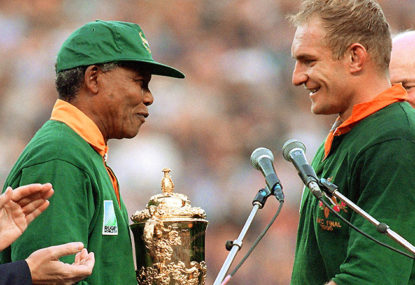President Obama used the phrase used after the death of Abraham Lincoln to sum up Nelson Mandela’s superb life eloquently and succinctly: ‘He is now for the ages.’
In the next few days there will be others far more eloquent than I can be making the case for Mandela as one of the great figures of world history, and the greatest son of Africa since and along side, I suppose, St Augustine, the archbishop of Hippo in Carthage.
For me, one of the great aspects about Mandela was his normalcy which was reflected in his passion for and knowledge of sports.
There are photos of the young Mandela, trim and taut, posing in his boxing shorts and gloves as an aspiring pugilist. I don’t know whether he had any fights in the ring. But the pose looks authentic enough and the photograph is a reflection of the time when one of the few ways out of poverty for black men in South Africa was success in the boxing ring.
I read, too, that when Mandela was released from jail that one of the first questions he asked was: ‘Is Don Bradman still alive?’
In captivity on Robben Island one of the cruellest aspects of the punishments, which was tougher on Mandela than the tedious, break-backing work of smashing rocks, was the way that information from the outside world, family, political, social or sporting was kept from the prisoners.
Mandela and his fellow inmates, political prisoners, worked out ways of finding out or intuiting what was happening. They ‘knew’, for instance, when the Springboks had lost a rare Test because on the Saturday night of the loss the evening meal was even more appalling and inedible thanit usually was.
It was Mandela’s profound knowledge and love of sport and its place in the psyche of white South Africans that he electrified the 72,000 spectators at Ellis Park, Johannesburg, for the final of the 1995 Rugby World by strolling on to the field for the official presentation of the team wearing the number 6 Springboks jersey, the number of the team’s captain Francois Pienaar.
When I saw this my mind went back to a remark made some decades earlier by Dr Danie Craven, the mastermind and administrator behind the greatness of the Springboks and South African rugby throughout the Apartheid Era: ‘No black will ever play for the Springboks.’
Here was a black man wearing the number 6 jersey and the mainly white crowd bursting into roaring applause as he made his dignified way through the ceremony.
One of those joining in the applause, and (to his credit) a leader, if discreet about it, in forcing the change that allowed blacks and coloured players into the Springboks, was Craven.
I’ve always thought that Mandela’s gesture of wearing the number 6 jersey was a telling example of how he was the supreme politician, in that he was he was in to win whatever political battle he was engaged in and that whatever it took to win, he was prepared to do that.
The battle that Mandela was engaged in at Ellis Park was convincing white South Africa that the transfer of power to the majority black population would enhance rather than belittle the life style that they had enjoyed under the Apartheid system.
And for whites, as he well knew from the infrequent rotten meals he had on Saturday nights in winter on Robben Island, a strong and successful Springboks side, a side that would win its first Rugby World Cup tournament, what was a Mandela-led government had to deliver.
So Mandela donned the Springboks jersey, a jersey that was despised by the black population because it was seen as a symbol of their oppression. By wearing the number 6 jersey, he cleansed the Springboks from the perceived sins of the past.
I would place this gesture in the same category, as a healing of the wounds decision, as President Lincoln ordering his troops to allow the defeated Confederate soldiers to keep their weapons as they made their long, slow way home to the devastated South.
And along with the generosity of spirit to the South African whites, there was a characteristic toughness in what Mandela did to hurt the chances of the All Blacks pulling off a victory.
Put yourself in the position of the All Blacks, leaving aside the fact that they were suffering from food poisoning. They were playing the final at the spiritual home of the home side, Ellis Park. There was a vast crowd that wanted to see them defeated. And now the most charismatic leader in modern times comes out on to the field, as one of them, wearing the captain’s jersey.
This was a very cruel thing that Mandela did to the All Blacks and to a country that had led the world opposition to the Apartheid system.
But as Lenin once said: ‘To make an omelette, it is necessary to break some eggs.’ Mandela had a purpose that day at Ellis Park. It was a wonderful purpose and was nothing less than to start the creation of a new South Africa, a Rainbow Coalition nation.
That purpose is still very much a work in progress. Mandela’s successors in the black leadership have not honoured his great vision and great life.
But the vision remains and will remain as a hostage to the future history of South Africa as long as the image of the black man wearing the number 6 jersey at Ellis Park remains.





























































































